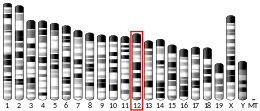COQ6
Coenzyme Q6 monooxygenase is a protein that in humans is encoded by the COQ6 gene.[5]
Function
The protein encoded by this gene belongs to the ubiH/COQ6 family. It is an evolutionarily conserved monooxygenase required for the biosynthesis of coenzyme Q10 (or ubiquinone), which is an essential component of the mitochondrial electron transport chain, and one of the most potent lipophilic antioxidants implicated in the protection of cell damage by reactive oxygen species. knockdown of this gene in mouse and zebrafish results in decreased growth due to increased apoptosis.[5]
Clinical significance
Mutations in this gene are associated with autosomal recessive coenzyme Q10 deficiency-6 (COQ10D6), which manifests as nephrotic syndrome with sensorineural deafness. Alternatively spliced transcript variants encoding different isoforms have been described for this gene.[6]
References
- GRCh38: Ensembl release 89: ENSG00000119723 - Ensembl, May 2017
- GRCm38: Ensembl release 89: ENSMUSG00000021235 - Ensembl, May 2017
- "Human PubMed Reference:". National Center for Biotechnology Information, U.S. National Library of Medicine.
- "Mouse PubMed Reference:". National Center for Biotechnology Information, U.S. National Library of Medicine.
- "Entrez Gene: Coenzyme Q6 monooxygenase".
- Heeringa SF, Chernin G, Chaki M, Zhou W, Sloan AJ, Ji Z, Xie LX, Salviati L, Hurd TW, Vega-Warner V, Killen PD, Raphael Y, Ashraf S, Ovunc B, Schoeb DS, McLaughlin HM, Airik R, Vlangos CN, Gbadegesin R, Hinkes B, Saisawat P, Trevisson E, Doimo M, Casarin A, Pertegato V, Giorgi G, Prokisch H, Rötig A, Nürnberg G, Becker C, Wang S, Ozaltin F, Topaloglu R, Bakkaloglu A, Bakkaloglu SA, Müller D, Beissert A, Mir S, Berdeli A, Varpizen S, Zenker M, Matejas V, Santos-Ocaña C, Navas P, Kusakabe T, Kispert A, Akman S, Soliman NA, Krick S, Mundel P, Reiser J, Nürnberg P, Clarke CF, Wiggins RC, Faul C, Hildebrandt F (2011). "COQ6 mutations in human patients produce nephrotic syndrome with sensorineural deafness" (PDF). J. Clin. Invest. 121 (5): 2013–24. doi:10.1172/JCI45693. PMC 3083770. PMID 21540551.
This article incorporates text from the United States National Library of Medicine, which is in the public domain.
External links
- Human COQ6 genome location and COQ6 gene details page in the UCSC Genome Browser.



